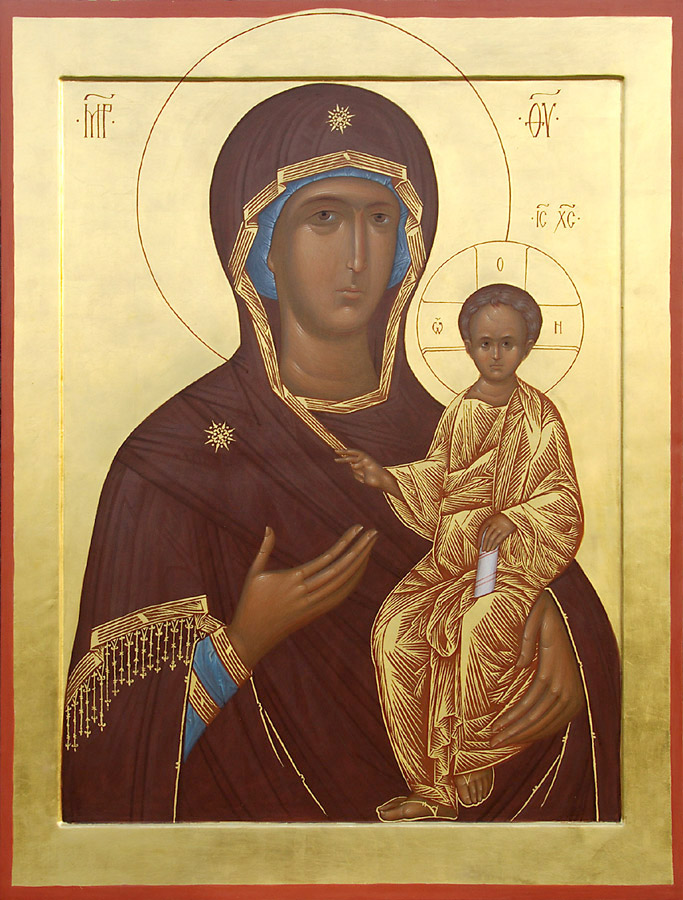
Text: Luke 11:27-28
In the middle of the 5th century, there was a major controversy in the Church. Nestorius, the Archbishop of Constantinople, was in conflict with Cyril, the Archbishop of Alexandria, over the relationship between Christ’s human and divine natures. Nestorius emphasized the distinction between the two natures. Cyril emphasized the unity of the two natures into Christ’s single personhood. As these two men were the top bishops of two of the five great Patriarchies in the ancient Church, this controversy was a very big deal indeed. As often happens with such controversies, the issues were distilled down to two competing slogans, though in this case the slogans took the form of titles given to the Blessed Virgin Mary. Nestorius and his supporters called her the Christotokos, the “Christ-bearer” or “Mother of Christ.” Cyril and his supporters called her the Theotokos, the “God-bearer” or “Mother of God.”
You see, if the Lord’s human and divine natures were as separate as Nestorius claimed, Mary only gave birth to the human Jesus. But if one cannot separate the Lord’s two natures, if the incarnation means that God the Son forever joined a human nature inseparably to his Divine nature, then the little baby in Mary’s womb was God himself. When the Emperor called the bishops from across the world to Ephesus, Mary’s final home, to work out the controversy in Council, the Council sided with Cyril. It is indeed appropriate to call Mary the “Mother of God,” because you cannot divide Jesus’ into a divine person and a human person. Though the Council recognized the distinction of Jesus’ divine and human natures, there is only one Divine Person who assumed a human nature. This Council of Ephesus in 451 became the 4th Ecumenical Council, a council that has always been affirmed by Anglicans as well as by Roman Catholics, Eastern and Oriental Orthodox, and the major branches of Protestantism. Not only do we say that the Council made the right call theologically, but we affirm that its teaching is the proper interpretation of the Bible’s teachings.
To be called the Theotokos is an amazing honor given to our Lord’s blessed mother. Yet, it’s important to point out that the title is less about Mary than it is about Jesus. The title isn’t so much about her honor as it is about Jesus’ identity. This can sometimes be confusing for many modern Christians, especially those from a more Evangelical background. There can be an understandable fear of over-emphasizing Mary in a superstitious way. Yet a proper understanding of her title and its history does indeed point us back to Jesus. It points us back to the one who is to be our focus.
We see something very similar happening at the end of today’s Gospel passage. And indeed, this is a passage that has great bearing on our Lady’s title of Theotokos. Luke 11:27:
And it came to pass, as [Jesus] spake these things, a certain woman of the company lifted up her voice, and said unto him, Blessed is the womb that bare thee, and the paps which thou hast sucked. But he said, Yea rather, blessed are they that hear the word of God, and keep it.
A well-meaning woman of the crowd, so very impressed by Jesus’ teaching, called out a blessing on his mother. After all, if the son is saying such amazing things and gathering such large crowds, his mother must be a very remarkable woman indeed. In fact, though the woman was probably unaware of the events reported 10 chapters ago in Luke’s gospel, one could argue that she was merely reaffirming the very thing Mary sang under the inspiration of the Holy Spirit in the Magnificat from Luke 1: “For behold, from henceforth all generations shall call me blessed.” Indeed, we Anglicans, following traditions that go back even further than the Council of Ephesus, also affirm this when we sing or recite the Magnificat as part of our Evening Prayer service most every day.
Jesus, for his part, doesn’t so much rebuke the woman as correct or perhaps re-direct her: true blessedness doesn’t come from that family connection, but from following God and his word. Indeed, St. Ephrem the Syrian, who is probably the greatest hymn writer of the Patristic era, says that Jesus actually takes the blessedness his mother sang about and gives it to all those who worship him. He notes that Mary had the blessing of baring the Lord in her womb for nine months, a limited time. Jesus’ followers will have the blessing of being united to Christ for all eternity.
Indeed, it would be a mistake to take Jesus’ response as implying that his mother isn’t blessed. Rather, the blessedness of being Jesus’ mother pales in comparison to the blessing of having faith in Christ. St. Augustine writes:
Mary was more blessed in accepting the faith of Christ than in conceiving the flesh of Christ. … [F]or his brothers, his relatives according to the flesh who did not believe in him, of what advantage was the relationship? Even her maternal relationship would have done Mary no good unless she had born Christ more happily in her heart than in her flesh.
Interestingly, other than Mary herself, and the Apostles who were related to Jesus (James, Jude, John, and the other James), we know very little about what happened to Jesus’ relatives after the Resurrection. Indeed, as far as Mary is concerned, she barely shows up in the other New Testament writings. Part of this is because Acts and the Epistles largely report the Gospel going west into the Greek-speaking world. Most of what we know about the missionary work to the east and south is largely from oral traditions written down well after the Apostles’ lifetimes.
That said, I’ve heard some scholarship tracing down those traditions which include reports of early Christian communities in the Middle East that claim to have been founded by various cousins and other kinfolk of the Lord. Indeed, it seems that the first several bishops of Jerusalem were blood relations to the Holy Family. But I do think it’s providential that Scripture itself doesn’t follow those people’s journey. It’s much more important for us to focus on the spiritual kinship we all have with Jesus through his shed blood than to focus on blood kinship and family relationships. After all, a big part of the Gospel message is God opening his family to all nations and all peoples. It’s not about physical ancestry or geography in the New Covenant. All peoples and all nations now belong to the Lord Jesus.
I’m reminded of another incident that takes place three chapters earlier in Luke’s Gospel, one of our Morning Prayer readings from last week. Luke 8:19:
Then came to him his mother and his brethren, and could not come at him for the press. And it was told him by certain which said, Thy mother and thy brethren stand without, desiring to see thee, and he answered and said unto them, My mother and my brethren are these which hear the word of God, and do it.
Again, it would be a mistake to see Jesus’ words in this passage as an insult to his mother or other family. The famous Reformer, John Calvin, says that they were probably either worried about his safety in such large crowds or wanted to hear him teach but were on the wrong side of those large crowds! Besides, he says, it’s not probable “that anyone accompanying the holy Mother would be an unbeliever.” So, again, we see that Jesus is not insulting his family, but he is rather pointing out the truer and greater kinship of all who follow him. As St. Basil the Great writes:
Intimacy with the Lord is not explained in kinship according to the flesh, but is achieved by cheerful willingness in doing the will of God.
The honor attributed to Jesus’ mother and brethren is the same honor all Christians have who are walking with the Lord and doing his will. We are all indeed his closest of kin when we’re living as Christians, following after his ways.
Because of the imagery in Revelation 12, the Blessed Virgin Mary is often seen as a symbol of the Church in traditional Christian typology. In Revelation 12, a “woman clothed with the sun, and the moon under her feet, and upon her head a crown of twelve stars” is with child and is persecuted by the great Dragon. Her son is the divine ruler of all nations and is caught up to God and his throne. Though the Dragon is defeated by Michael and the heavenly hosts, he continued in his wrath to “make war with the remnant of her seed, which keep the commandments of God, and have the testimony of Jesus Christ.” The symbolism is pretty clear. The Lord’s mother is also shown symbolically as the mother of all of his brethren, those who follow him.
So, just as Mary, the Theotokos, bore the Incarnate Lord in her womb, so does the Church bring Jesus to the unbelieving world. Just as Revelation 12 describes her as the mother of the Lord’s brethren, so is the Church our Mother, bearing children for our Heavenly Father. Mary’s temporal blessedness as the mother of Jesus points to a greater blessedness in which both she and we share as we follow Jesus and carry out his work here on earth.
So, how does this apply to Lent? Why does our Gospel for the 3rd Sunday in Lent include these two verses about true blessedness and our spiritual kinship with the Lord? Remember that the Lord’s 40 days in the wilderness were intentional warfare on his part. As we read two weeks ago, he was sent by the Holy Spirit for the purpose of being tempted by the Devil. He was sent to succeed where Israel and Adam had failed. He went into the wilderness to fight. Similarly, we enter into our period of repentance and fasting for to fight. We fight against the world, the flesh, and the devil by denying ourselves, by turning to God, by following in the Lord’s footsteps. That is, Lent is about living up to that call to “hear the word of God, and keep it.” It is about living up to our new identity as his brethren, those “which hear the word of God, and do it.”
Also remember that just as Jesus was in the wilderness for 40 days prior to his baptism, so Lent was originally a time for catechumens to spend 40 days preparing for their baptisms. For us who are already baptized Christians, that means that Lent is a time to remember what baptism means. Baptism is the sign of our union with Christ. It is the sign of being washed by his blood, of being buried with him and rising again with him. It is the sign of our new birth.
That means that we hear God’s word and keep it not in order to be blessed, not in order to become Christ’s brethren, but because we are blessed with that kinship. We hear God’s Word and do it because we are his brethren. When Mary said, “behold the handmaiden of the Lord,” the Holy Spirit came upon her. When we say the same in our baptism, the Holy Spirit similarly comes upon us. Christ gives us the same blessing as he gave his mother because, like her, he’s already given us faith. May we go and live out that blessed faith, just as the Lord’s blessed mother did before us.
In the Name of the Father, and of the Son, and of the Holy Ghost. Amen.

